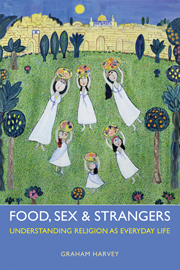Book contents
- Frontmatter
- Dedication
- Contents
- Preface
- 1 Of god and goats
- 2 Religioning elsewhere
- 3 Christianity is not a religion
- 4 Talking like a pirate
- 5 Real world
- 6 Doing violence with impunity
- 7 Respecting relations
- 8 Things full of meaning
- 9 Purity and pilgrimages
- 10 Enchantment and emplacement
- 11 Christians do religion like other people
- 12 Religion is etiquette in the real world
- Bubliography
- Index
7 - Respecting relations
- Frontmatter
- Dedication
- Contents
- Preface
- 1 Of god and goats
- 2 Religioning elsewhere
- 3 Christianity is not a religion
- 4 Talking like a pirate
- 5 Real world
- 6 Doing violence with impunity
- 7 Respecting relations
- 8 Things full of meaning
- 9 Purity and pilgrimages
- 10 Enchantment and emplacement
- 11 Christians do religion like other people
- 12 Religion is etiquette in the real world
- Bubliography
- Index
Summary
Columbus and his collaborators and successors in the European imperial conquest of the Americas frequently declared that they could find nothing like religion, or nothing like Christianity, among indigenous peoples. Given the charter documents of their project – in which the conquest, enslavement and despoiling of “discovered” peoples is predicated on their failing to have a “Christian prince” (see Newcomb 2008) – this was perhaps a fortunate failing. It seems unlikely that people who were busy resisting, surviving or succumbing to the European onslaught would have much time or interest in inviting Columbus and company to many of the myriad ceremonial complexes of the continent. Mostly, however, the cry “no religion” seems disingenuous. At another extreme, more recent interpreters have claimed to find that beliefs in supernatural and/or transcendent entities are widespread among Native Americans. Here, the effect of adopting a theological approach to religion seems evident. Neither view is particularly helpful in understanding either Native American religions nor in defining “religion” for academic purposes.
In Chapter 6 I pondered how Europeans managed without the word “taboo” prior to Captain Cook's Oceanic voyages. Now I ask what the word “totem”, originating among speakers of Algonkian languages in what is now North America (but also remains indigenous homelands), might contribute to a redirection of our gaze towards non-transcendent, non-metaphysical but thoroughly empirical evidence about something we might call religion.
- Type
- Chapter
- Information
- Food, Sex and StrangersUnderstanding Religion as Everyday Life, pp. 117 - 134Publisher: Acumen PublishingPrint publication year: 2013



